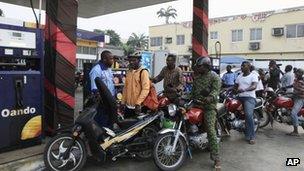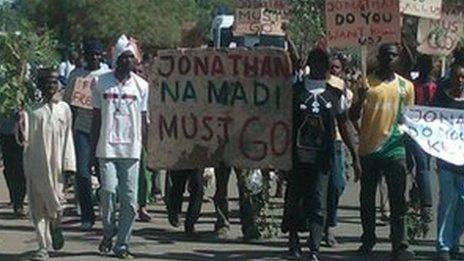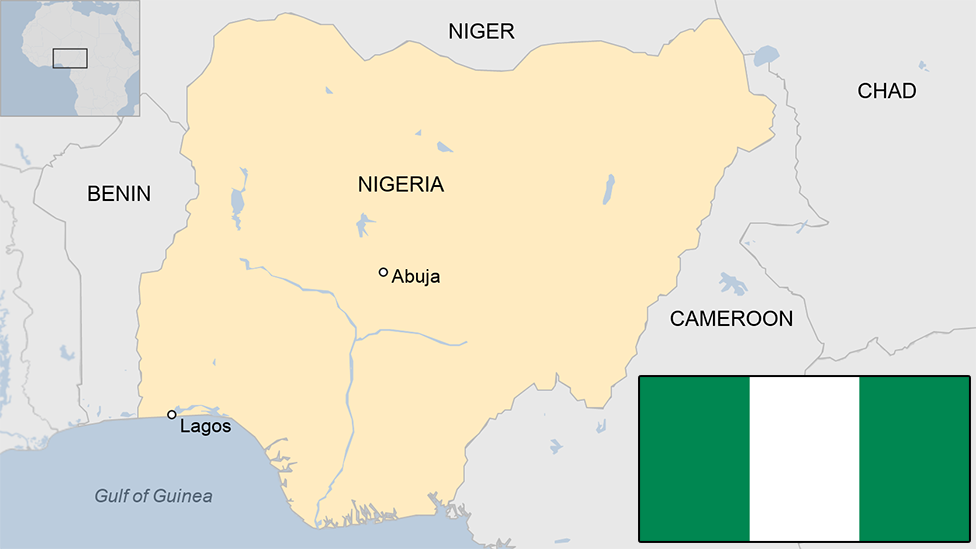Nigeria fuel strike brings country to a halt
- Published
Yusuf Tuggar, a former member of Nigeria's House of Representatives: ''It is clearly unacceptable to Nigerian people, the majority of them are living on less than $2 a day''
A general strike in Nigeria over the elimination of a fuel subsidy has brought the country to a standstill.
Shops, offices, schools and petrol stations around the country closed on the first day of an indefinite strike.
In Lagos and other cities, thousands marched against the removal of the subsidy, which has doubled fuel costs.
Police fired on protesters in Kano in the north, reportedly killing two and wounding many. Another demonstrator died in a clash with police in Lagos.
President Goodluck Jonathan has said the subsidy was economically unsustainable.
In the commercial capital, Lagos, police and demonstrators clashed as about 10,000 people took part in a rally against the rising fuel prices.
Some protesters waved placards bearing an effigy of President Jonathan with devil horns and fanged teeth, and showing him pumping fuel at a gas station.
"Our leaders are not concerned about Nigerians. They are concerned about themselves," protester Joseph Adekolu told the Associated Press news agency.
One demonstrator was killed and three wounded, witnesses and hospital sources said.
In Kano, Nigeria's second-largest city, at least 30 people were injured as police used tear gas and fired in the air to disperse protesters converging on the governor's office.
Two demonstrators later died, hospital sources said. A night-time curfew is in force in the city.
In the capital, Abuja, trade unions and civil society groups organised a march and protesters closed the airport.
Smuggled fuel
Fuel and transport costs doubled after the subsidy ended on 1 January, angering many Nigerians, who saw it as the only benefit they received from the country's vast oil wealth.
Most of Nigeria's 160 million people live on less than $2 (£1.30) a day, so the sharp price increases have hit them hard.
Finance Minister Ngozi Okonjo-Iweala: "We were not able to fund basic services"
"With these increases, the cost of transport has gone up and this has also affected the cost of food, and the basic necessities of life, such as rents, school fees and medical bills," said Chris Uyot, a spokesman for the Nigeria Labour Congress, one of the strike's organisers.
Nigerian Information Minister Labaran Maku called on unions to end the strike, saying the government was ready for dialogue.
He told the BBC the authorities were doing their best to reduce the hardship caused by removing the subsidy.
A similar strike in 2003 ended with a partial climbdown, when the Nigerian government agreed to reduce the subside, rather than scrapping it altogether.
Despite being a major oil producer, Nigeria has not invested in the infrastructure needed to produce refined fuel, so has to import much of its petrol.
With the subsidy, fuel was much cheaper in Nigeria than neighbouring countries, so some of it was smuggled abroad.
Members of parliament have called on President Jonathan to reconsider, but he made a televised address on Saturday to defend the the subsidy cut.
"We must act in the public interest, no matter how tough, for the pains of today cannot be compared to the benefits of tomorrow," he said.
The deregulation of the petroleum sector was, he insisted, the best way to curb corruption and ensure the survival and growth of the economy.

Nigerians queued to buy petrol ahead of the strike
"The truth is that we are all faced with two basic choices... either we deregulate and survive economically, or we continue with a subsidy regime that will continue to undermine our economy."
He said that top government officials would, from this year, take a 25% pay cut, and foreign trips would also be reduced.
The government says it will spend the $8bn (£5bn) it saves each year by scrapping the subsidy on improving health, education and the country's erratic electricity supply.
However, many Nigerians fear it is more likely to end up in the pockets of corrupt officials.
The unrest comes at the same time as a surge in sectarian violence. The Islamist militant group Boko Haram has carried out a string of deadly attacks in recent weeks, mainly against Christian targets in the north-east.
On Monday a crowd attacked a mosque in Benin city in the south. More than 40 people were injured, the Red Cross says.
- Published9 January 2012

- Published23 July 2010
- Published28 July 2023
